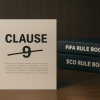Reglamentos Deportivos (TAS) Reglas de interpretación

1 / 1
La interpretación de las leyes y los reglamentos parte del significado literal de la norma que se debe interpretar (interpretación literal). No hay razón para apartarse del texto llano, a menos que existan razones objetivas para pensar que no refleja el sentido esencial de la disposición examinada.
Esto puede resultar de la historia de la redacción de la disposición, de su finalidad o de la interpretación sistemática de la ley. Cuando el texto no es del todo claro y existen varias interpretaciones posibles, habrá que acotar el verdadero alcance de la disposición teniendo en cuenta todos los factores pertinentes, como su relación con otras disposiciones legales y su contexto (interpretación sistemática), el objetivo perseguido, especialmente el interés protegido (interpretación teleológica), así como la intención del legislador tal y como se refleja, entre otros, de la historia de la redacción de la pieza legislativa en cuestión (interpretación histórica). Cuando se deba interpretar una norma, se adoptará un enfoque pragmático y se seguirá una pluralidad de métodos, sin asignar ninguna prioridad a los distintos medios de interpretación.
El artículo 18bis del RSTP tiene por objeto (i) proteger las políticas y operaciones deportivas de los clubes de fútbol de la influencia indebida de otras partes y (ii) evitar los conflictos de intereses que puedan dar lugar a prácticas que afecten a la integridad de la competición. El artículo 18bis del RSTP engloba una prohibición relacionada con la conducta del club al celebrar un contrato. Se trata, por tanto, de una disposición que puede restringir significativamente la libertad de contratación de las partes, lo que constituye un principio fundamental en el Derecho suizo y en cualquier legislación de economía de mercado. En consecuencia, una disposición restrictiva de este tipo debe interpretarse de forma restrictiva y aplicarse caso por caso, teniendo en cuenta que, en caso de duda, el órgano jurisdiccional debe favorecer el principio de libertad contractual (in dubio pro libertate).
La prohibición consagrada en el artículo 18bis del RSTP no pretende limitarse a los casos de influencia “directa”. En efecto, la redacción de esta norma no distingue entre influencia directa e indirecta y, de acuerdo con la máxima “ubi lex non distinguit, nec nos distinguere debemus” (es decir, “donde la ley no distingue, tampoco debemos distinguir”), no es necesario idear una distinción no prevista por la norma correspondiente. Además, si se hiciera esa distinción, sería más fácil eludir la prohibición del artículo 18bis del RSTP; en particular, su objetivo perseguido se vería frustrado por la mera redacción de las cláusulas contractuales pertinentes para evitar conferir cualquier poder de decisión directo a otra parte. Por lo tanto, tanto el lenguaje como la finalidad del artículo 18bis del RSTP apuntan a una interpretación según la cual la influencia ejercida por otra parte en un club no necesita ser “directa” para entrar en el ámbito de aplicación de dicha norma. El elemento básico que hay que tener en cuenta es, más bien, la eficacia y el impacto de la influencia, independientemente de que sea directa o indirecta. En otras palabras, la influencia debe ser efectiva y tener el potencial de influir realmente en las decisiones del club en el grado requerido por la norma.
The interpretation of statutes and regulations starts from the literal meaning of the rule, which falls to be interpreted (literal interpretation). There is no reason to depart from the plain text, unless there are objective reasons to think that it does not reflect the core meaning of the provision under review. This may result from the drafting history of the provision, from its purpose, or from the systematic interpretation of the law. Where the text is not entirely clear and there are several possible interpretations, the true scope of the provision will need to be narrowed by taking into account all the pertinent factors, such as its relationship with other legal provisions and its context (systematic interpretation), the goal pursued, especially the protected interest (teleological interpretation), as well as the intent of the legislator as it is reflected, among others, from the drafting history of the piece of legislation in question (historical interpretation). When called upon to interpret a rule, a pragmatic approach is to be adopted and a plurality of methods be followed, without any priority to the various means of interpretation being assigned.
Article 18bis RSTP is aimed at (i) protecting the sporting policies and operations of football clubs from being unduly influenced by other parties and (ii) avoiding conflicts of interests that might lead to practices affecting the integrity of the competition. Article 18bis RSTP encompasses a prohibition related to the club’s conduct when entering into a contract. It is thus a provision that has the potential to significantly restrict the parties’ freedom of contract; this is a fundamental principle under Swiss Law and under any market-economy legislation. Accordingly, such a restrictive provision must be construed narrowly and applied on case-by-case basis bearing in mind that, in case of doubt, the adjudicating body must favour the principle of freedom of contract (in dubio pro libertate).
The prohibition enshrined in Article 18bis RSTP is not meant to be limited to instances of “direct” influence. Indeed, the wording of this rule does not distinguish between direct and indirect influence and, in accordance with the maxim “ubi lex non distinguit, nec nos distinguere debemus” (i.e. “where the law does not distinguish, neither should we distinguish”), there is no need to devise a distinction not provided by the relevant rule. Moreover, if that distinction were to be made, it would be easier to circumvent the prohibition of Article 18bis RSTP; in particular, its pursued objective would be frustrated by simply drafting the relevant contractual clauses in order to avoid conferring any direct decision-making power to another party. Therefore, both the language and the purpose of Article 18bis RSTP point to a construal under which the influence exercised by another party on a club need not be “direct” to fall within the scope of said rule. The basic element to look at is, rather, the effectiveness and impact of the influence, irrespective of its being direct or indirect. In other words, the influence must be effective and have the potential to actually impact the club’s determinations to the degree required by the rule.
Archivos adjuntos
Identificación
6198
Publicado
mayo 10, 2021
Vistas:
449
Más de este usuario
Te puede gustar
Copyright © 2024 JurisDeportiva . Todos los derechos reservados.



























